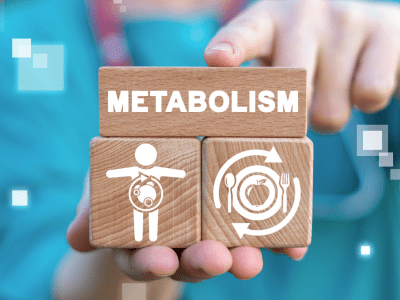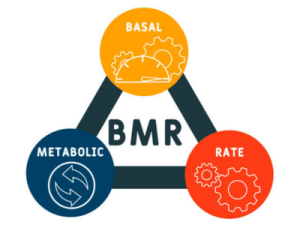How to Speed Up a Slow Metabolism?

-
Posted by
 Prachi Shah
Prachi Shah
What is Metabolism?
Metabolism refers to the complex biochemical processes that occurs within living organisms to maintain life. It encompasses a wide range of chemical reactions that enable cells to obtain and utilize energy from nutrients, synthesize molecules essential for growth and repair, and eliminate waste products.
There are two primary aspects of metabolism:
- Catabolism: Catabolic reactions involve the breakdown of complex molecules into simpler substances, releasing energy in the process. For example, during cellular respiration, glucose molecules are broken down into carbon dioxide and water, and energy is released and stored in the form of adenosine triphosphate (ATP).
- Anabolism: Anabolic reactions involve the synthesis of complex molecules from simpler substances, requiring energy input. For example, anabolic processes include the synthesis of proteins from amino acids and the synthesis of nucleic acids from nucleotides.
How does the process work?
Metabolism is governed by enzymes, which are biological catalysts that accelerate chemical reactions within cells. Enzymes facilitate metabolic pathways by lowering the activation energy required for reactions to occur, allowing cells to efficiently carry out essential metabolic processes.
The rate of metabolism, known as metabolic rate, varies among individuals and is influenced by factors such as age, sex, body composition, genetics, hormonal status, physical activity level, and diet. Basal metabolic rate (BMR) refers to the energy expended by the body at rest to maintain essential physiological functions, such as breathing, circulation, and cellular repair.
How does body composition affect basal metabolic rate?

Studies have shown that body composition plays a major role in energy intake and energy expenditure. Body composition plays a significant role in determining Basal Metabolic Rate (BMR) because different tissues in the body require varying amounts of energy to maintain metabolic functions. Our body comprises of muscle mass, fat mass, water and skeletal mass. Out of these, all masses hold weight except for fat mass, which is lighter comparatively but it holds volume. Factors affecting body composition:
- Lean Body Mass (LBM): Lean body mass, which includes muscles, bones, organs, and water, is metabolically active tissue that requires energy for maintenance and repair. Muscles, in particular, are highly metabolically active and consume more energy at rest compared to fat tissue. Therefore, individuals with higher muscle mass tend to have higher BMRs because muscles require more energy to sustain themselves.
- Fat Mass: While fat tissue is less metabolically active than lean tissue, it still contributes to BMR. Fat cells require energy for metabolic processes and hormone production. However, compared to muscle tissue, fat tissue has a lower metabolic rate. Therefore, individuals with higher percentages of body fat tend to have lower BMRs compared to those with higher muscle mass.
- Age: Age influences body composition and metabolic rate. As people age, they tend to experience a decrease in muscle mass and an increase in body fat percentage. This shift in body composition can result in a decrease in BMR, as muscle tissue is more metabolically active than fat tissue.
- Gender: Gender differences in body composition also affect BMR. Generally, men tend to have a higher percentage of lean body mass and lower body fat percentage compared to women. As a result, men typically have higher BMRs than women of the same age and weight.
- Hormonal Factors: Hormones play a crucial role in regulating metabolism and body composition. Thyroid hormones, such as thyroxine (T4) and triiodothyronine (T3), influence BMR by regulating cellular metabolism and energy expenditure. Additionally, sex hormones, such as testosterone and estrogen, can affect body composition and metabolic rate.
- Genetics: Genetic factors can also influence body composition and metabolic rate. Some individuals may have a genetic predisposition to higher or lower BMRs based on their family history and genetic makeup.
All in all there are various factors that affect an individuals BMR so just focusing on getting leaner body mass to increase BMR is not appropriate. One needs to work on all the above aspects to boost their metabolism by not ruining other factors.
How to increase your lean body mass?

Increasing lean muscle mass involves a combination of resistance training, proper nutrition, adequate rest, and consistency. Here are some strategies to help you build lean muscle:
- Resistance Training: Engage in regular strength training exercises that target major muscle groups, such as squats, deadlifts, bench presses, rows, and overhead presses. Aim to incorporate compound exercises that work multiple muscle groups simultaneously, as they are effective for stimulating muscle growth and strength development.
- Progressive Overload: Gradually increase the intensity of your workouts over time by progressively increasing the weight lifted, the number of repetitions, or the training volume. This progressive overload principle challenges your muscles and promotes muscle adaptation and growth.
- Include Isolation Exercises: While compound exercises should form the foundation of your training program, incorporating isolation exercises that target specific muscle groups can help address imbalances and promote balanced muscle development.
- Nutrient-Rich Diet: A well-balanced diet that provides adequate protein, carbohydrates, and healthy fats to support muscle growth and recovery. Aim to consume high-quality protein sources, such as lean meats, poultry, fish, eggs, dairy products, legumes, tofu, paneer, to provide essential amino acids for muscle repair and synthesis.
- Eat Sufficient Calories: To support muscle growth, ensure you’re consuming enough calories to meet your energy needs. Consume a slight calorie surplus, particularly from nutrient-dense foods, to provide the energy and nutrients required for muscle repair and growth.
- Prioritize Protein: Protein is essential for muscle repair, recovery, and growth. Aim to consume protein-rich foods at each meal and snack to optimize muscle protein synthesis. The recommended protein intake for individuals looking to build muscle is around 1.5 to 2.2 grams of protein per kilogram of body weight per day.
- Stay Hydrated: Adequate hydration is crucial for optimal muscle function, performance, and recovery. Drink plenty of water throughout the day, especially before, during, and after workouts, to maintain hydration status, support muscle function and assimilation of protein.
- Get Sufficient Rest and Recovery: Allow your muscles adequate time to rest and recover between workouts. Ensure you’re getting enough sleep each night to support muscle repair and growth, and consider incorporating active recovery techniques such as foam rolling, stretching, and mobility exercises.
- Be Consistent: Building lean muscle mass takes time, patience, and consistency. Stick to your training program, stay disciplined with your nutrition, and be patient as you work towards your muscle-building goals.
Studies have shown that lean body mass, BMR and dietary intake are gender dependent with a significant association between lean body mass and intake of proteins and fats in females, but not in males.
So even though females have more fat mass, through regular workout and appropriate diet they can change their body composition.
Which foods can be eaten to boost your metabolism ?

A well balanced diet consisting of equal amounts of carbs, protein, fibres, good fats, vitamins and minerals is ideal to get a boost in metabolism with more focus on proteins. When aiming to increase lean muscle mass, it’s important to consume adequate protein to support muscle repair and growth, along with sufficient calories to fuel your workouts and recovery. Additionally, focus on nutrient-dense foods that provide essential vitamins, minerals, and antioxidants to support overall health and well-being.
It’s also beneficial to distribute your protein intake evenly throughout the day and consume a balance of protein, carbohydrates, and fats with each meal and snack to optimize muscle protein synthesis and energy levels.
Foods to include in your daily diet-
- High quality protein: Chicken breast, egg whites, low fat dairy products (greek yogurt, paneer, milk)
- Plant based protein: Legumes, tofu, edamame, quinoa, soy products
- Healthy fats: nuts, seeds, nut butter, avocados, cold pressed oils
- Complex carbohydrates: Brown rice, oats, quinoa, whole wheat, sweet potatoes
- Fruits and vegetables: bananas, berries, oranges, bell peppers, watermelons, cucumbers
- Coffee: Coffee contains caffeine, a stimulant that can temporarily boost metabolism and increase energy expenditure
- Iron-Rich Foods: Iron is essential for the production of hemoglobin, a protein in red blood cells that carries oxygen throughout the body.
Incorporating nutrient dense foods along with regular exercise routine, good sleep cycle and stress management are essential components for healthy lifestyle that can support metabolic health and overall well-being. Certain foods might have modest effect on metabolism so focusing on overall dietary pattern is the key to enhance metabolic function and achieve long-term health goals.



